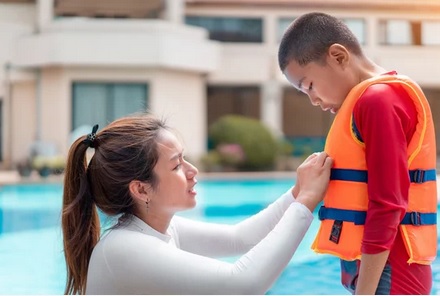 Swimming is a terrific way to keep kids active and entertained all summer! It’s also a good way to beat the heat.
Swimming is a terrific way to keep kids active and entertained all summer! It’s also a good way to beat the heat.
However, the fun of swimming comes with risks — some are nuisances while others can be life-threatening.
Below are a few ways parents can keep their children safe when at the swimming pool this summer:
Screen Out Sunburn
 Sunburns are painful right away and can haunt you years later with an increased risk of skin cancer. Water can intensify sun exposure and increase the risk of skin damage. Before swimming, be sure to apply sunscreen to your child’s entire body. If using spray products, an adult should spray sunscreen into their hands and then rub/apply to their child. (Due to their delicate skin, do not apply sunscreen to children younger than 6 months of age.)
Sunburns are painful right away and can haunt you years later with an increased risk of skin cancer. Water can intensify sun exposure and increase the risk of skin damage. Before swimming, be sure to apply sunscreen to your child’s entire body. If using spray products, an adult should spray sunscreen into their hands and then rub/apply to their child. (Due to their delicate skin, do not apply sunscreen to children younger than 6 months of age.)
Reapply sunscreen on a regular basis, at least every 2 hours, if not sooner.
Sun protective swimsuits, rash guards, and shirts are also highly recommended.
Protect the Ears
 The pain of swimmer’s ear can ruin a good time in the water and also put a damper on regular life activities.
The pain of swimmer’s ear can ruin a good time in the water and also put a damper on regular life activities.
Known in medical circles as Otitis Externa, swimmer’s ear results from infection and swelling of the outside of the ear. Swimmer’s ear is often due to prolonged exposure to moisture (such as pools).
Typical symptoms include pain and discharge from the outer ear along with difficulty chewing. Antibiotic and anti-inflammatory ear drops are often used for treatment. In more severe cases, oral pain medicines or antibiotics may be prescribed. Most athletes who are diagnosed with swimmer’s ear will need a minimum of 2-3 days out of the water before being able to return.
To prevent swimmer’s ear, regularly use preventative ear drops in both ear canals after each and every water exposure. (Two drops is recommended.) The combination of rubbing alcohol (isopropyl alcohol) and acetic acid (vinegar) can be purchased over-the-counter. The drops can also be made at home with a 50:50 mixture of rubbing alcohol and vinegar.
In addition, don’t be over-aggressive with cleaning wax from the ear canals. Sufficient wax is the friend of a swimmer. A lack of wax in the ear canals increases the risk of infection, especially if small abrasions are left after vigorous attempts at wax removal.
After swimming, be sure to dry out those ear canals. Tilt the head toward each shoulder to try and allow water drainage from the ear canals. Using a hair dryer at the lowest setting can also help dry out the canals. Just don’t get too close. Excessive heat can increase the risk of hearing damage.
Be careful with metal earrings that can sensitize the ear to a higher risk of infection. If possible, remove any piercings before swimming, especially in cases of recurrent swimmer’s ear infections.
Don’t Swim When You’re Sick
 Colds and coughing may make underwater breathing more difficult, especially for younger children.
Colds and coughing may make underwater breathing more difficult, especially for younger children.
Avoid swimming with diarrhea and then for several days (or even a week or two) afterward to reduce the risk of contaminating pools or other bodies of water. Last summer, an Irvine community pool was evacuated because of this issue (poop in the pool).
Don’t Jump into a Pool Headfirst
From the earliest swim lessons, parents should teach kids to put their arms out when diving into water — or enter bottom first — especially when entering shallow water in pools or the shores of lakes/oceans.
If diving into ocean waves, teach your child to dive arm-first down under oncoming waves rather than directly into them.
Never Swim Without Supervision
 A designated water watcher — a trained lifeguard or an observant adult — should always be on duty when kids are in the water. Just remember that a water watcher must know how to swim, recognize a child in distress, and have the strength to rescue a child in trouble. They must also know CPR. Water watchers and lifeguards are an extra layer of protection, but they are not a substitute for parental supervision.
A designated water watcher — a trained lifeguard or an observant adult — should always be on duty when kids are in the water. Just remember that a water watcher must know how to swim, recognize a child in distress, and have the strength to rescue a child in trouble. They must also know CPR. Water watchers and lifeguards are an extra layer of protection, but they are not a substitute for parental supervision.
Don’t Trust Floaties
 Floaties, also known as water wings or inflatable arm bands, are not a reliable means of drowning prevention. They can give both children and adults a false sense of security, potentially leading to less supervision and a belief that children are safer than they actually are in the water. Additionally, floaties can easily slip off or deflate.
Floaties, also known as water wings or inflatable arm bands, are not a reliable means of drowning prevention. They can give both children and adults a false sense of security, potentially leading to less supervision and a belief that children are safer than they actually are in the water. Additionally, floaties can easily slip off or deflate.
A U.S. Coast Guard-approved life jacket is a much safer and more reliable flotation device, especially for new and unskilled swimmers.
By following these simple tips, your family can remain safe while enjoying a summer of fun at the pool.
- Prevent a Holiday Illness by Ensuring Your Family is Vaccinated Against Preventable Diseases - December 18, 2025
- Holiday Safety Tips - December 14, 2025
- Immunizations Against Preventable Diseases Save Lives - September 30, 2025



